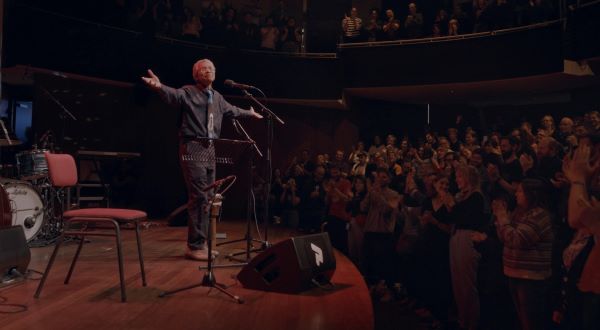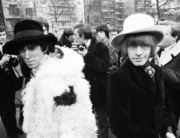
Once in a blue moon, a documentary surfaces that profiles someone so innately decent, so inspiring that it washes away any cynicism one may have about the workings of the world. Glenn Copeland, the subject of Keyboard Fantasies, is one of those people.
Growing up Black and lesbian in a well-to-do family in suburban Philadelphia in the 1950s, Copeland (who uses the he/him pronouns) was, by his own admission, cloistered from the social unrest in the outside world. His father was a classical pianist, and his mother sang, played multiple instruments, and raised him to become a musician. Always open about who he was, he was an out lesbian at Montreal’s McGill University in the early ’60s before that was accepted and transitioned roughly 20 years ago, in the “early days,” as he calls it, of transgender acceptance.
Around 1970, he recorded an album that was clearly influenced by Joni Mitchell and then composed music for Sesame Street and performed in a children’s TV show in Canada (these gigs are not covered in the film). In the early 1980s, he bought an Atari computer and fell in love with it and produced the album Keyboard Fantasies, which was almost totally created by the computer, with his ethereal vocals accompanying the music. It sold possibly 50 copies.
Then in 2015, a Japanese record store owner discovered the album and started asking Copeland for more copies and then more and more. Suddenly Copeland became a cult artist based on an album he had recorded and released 30 years earlier. This in itself is a heartwarming story, but it is only the leadup. Copeland begins touring and promoting an album he released all those many years ago with a group of players in their early to mid-twenties. He also mentors them.
To say Copeland is irrepressible is an understatement. He claims his musical facility is just him being a conduit for nature and the universe. He thinks of himself as a “radio that is tuned to certain frequencies.” If someone like Sting said that, it would be considered condescending, but Copeland means it in the most humbling way possible.
This is a big, sloppy wet kiss of a film. It’s as if Ted Lasso were a trans avant-garde musician. And like Lasso, there is pain. Copeland talks about being openly lesbian in the late ’60s and early ’70s, about being trans long before it was remotely acceptable. But he talks about it as someone who has moved past pain into something else. He does not let it define him. He defines himself.
The Keyboard Dreams album, both in its initial electronic form and in the concert footage, is gorgeous. Copeland’s warm, expansive voice is not so much fighting against the sterility of the sounds coaxed from his Atari computer as much as dancing and melding with it, and the rhythms are sinuous. You hear many influences: classical, jazz, samba, and composers like Steve Reich. It’s fascinating to hear this and contrast it with Copeland’s early work, which is just as exquisitely beautiful but sounds more like an earthier Joni Mitchell. When he and his young band perform, the music transcends even more. It has an exquisite stateliness that is somehow also grounded and sinewy.
Director Posy Dixon manages the feat of making Copeland’s story expansive though the film runs a trim 71 minutes. (At least 15 minutes is focused on performances.) She moves the story along without sacrificing Copeland’s irrepressible personality.
Keyboard Fantasies is perfect for viewers looking to be inspired, or if they want to hear great music.






Leave A Comment